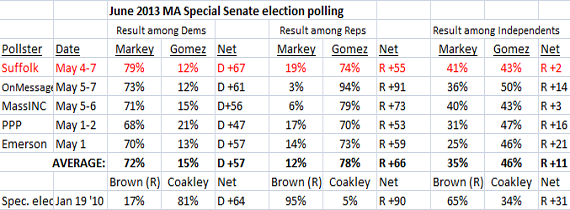 |
| Obama''s campaign visit wasn't enough to lift Martha Coakley in 2010, perhaps because his job approval was low, even for a state as Democratic as Massachusetts. But the President will be in a much better position when he campaigns for Ed Markey Wednesday. Photo on left courtesty of Michael Dwyer/AP/Corbis, photo on right found here. |
With the Massachusetts special senate race just over two weeks away, pollsters are providing us with a mini-avalanche of new data, a great deal of which appears conflicting at times. But one thing the pollsters seem to agree on this go 'round is the level of Massachusetts approval for the job President Barack Obama is doing in Washington D.C.
Despite having endured what many would refer to as the worst month of his Presidency (it started with the Benghazi whistleblower in early May, then moved to the IRS scandal, then the James Rosen Fox News Reporter dust-up, then the A.P. phone records scandal, followed by the NSA whistleblower, culminating in today's State Department scandal), Massachusetts still largely approves of the job he's doing. Obama manages an average 57% job approval rating in what is arguably America's bluest state. Just 39% of Bay-Staters disapprove of the job he is doing. See the chart below:
 |
| Several polling firms did not test Obama's job approval/disapproval rating. |
With only one exception (the UMass/YouGov poll), Obama's net job approval rating is relatively high, certainly compared to his national average. It ranges from +31 in the first Suffolk survey, to a low of +1 in the YouGov poll. Compare that, however, to his job approval/disapproval rating in the 3 weeks before the 2010 special election between Scott Brown and Martha Coakley:
 |
| Only pre-election polls that surveyed Obama's job approval/disapproval rating are included in the above chart. Data compiled from Real Clear Politics and Huffington Post Pollster. |
2010 "likely voters" were much more down on the job the President was doing then than they are now. His average rating is a net 10 points lower than it was in Massachusetts three years ago. His spread ranged from +1 to +16, though Rasmussen was the only pollster to show Obama's net approval rating as high as double digits. The rest found it in the low single digits.








